To keep students at GW, officials are making their work personal.
Oliver Street, the executive director of enrollment retention, was hired in August as the first person ever to hold the position and said he is measuring retention holistically, rather than relying on numerical data. Street said he plans to increase retention by collaborating with academic and administrative departments and meeting with students one-on-one to better understand why they stay at GW or why they might want to leave.
Retention – or keeping students at GW to make sure they graduate – has been a priority for University President Steven Knapp and other top officials over the past year. And because GW’s operating revenue is roughly 60 percent dependent on tuition dollars, officials are financially motivated to keep students on campus.
“We’ll be looking at individual students, the actual GWIDs and names, going student by student who is not here and was here to try to ensure they have the support and resources necessary to be successful,” Street said of his approach to retention.
Street said he is examining “social engagement data” by speaking with students and administrators to gauge how their efforts work. Street said the data will be collected through surveys, focus groups and individual meetings.
“I’m always asking students ‘what is your experience like?,’” Street said. “I’m getting thousands of pieces of data every time I talk to those students and do those activities.”
Street said that he interacts with students often by attending student organization meetings and as a faculty in residence in Mitchell Hall.
With an already high retention rate of 93 percent – which is higher than peer institutions like Boston and New York universities – Street said his goal is for GW to increase that rate in small but steady increments to improve both graduation rates and students’ success.
About 75 percent of freshmen students graduate within four years, and within the last eight years, about 20 percent of each freshman class dropped out or transferred after four years.
Street said because it can take years for retention data to be finalized and released – the most current numbers available are for the Class of 2009 – he will gauge the office’s success based on individual conversations with students. For example, if a student who was thinking of leaving GW decides to stay, he said he would speak with that student about that experience and what led to the decision.
Laurie Koehler, the vice provost for enrollment management and retention, said students are often influenced to stay or leave GW based on factors that cannot be explained by data, like a sense of community.
“We ultimately know every student who we admit to this institution is capable of being successful here,” Koehler said. “We know they are capable academically. But there are all sorts of reasons a student might not stay that aren’t related to academics, or they are, so how can we make sure every student leaves here having had a good experience and a degree?”
Koehler said Street, along with enrollment retention officer Lindsay Peck, is well-positioned for the role because he has the balance of being both data and student-oriented in managing retention.
Street was the director of the honors college at Stony Brook University from December 2009 to November 2011, where he managed strategic planning and implementation of recruitment. From November 2011 to August 2016 he was at West Virginia University, first as the assistant dean of the school of journalism and then as the university’s associate registrar.
Street said those roles allowed him to not just analyze the data surrounding students in his positions in admissions offices but to work one-on-one with students.
“That combination of seeing that it’s not simply student characteristics, not what a student has done or their background as they enter the institution but also what the institution provides – support structure, system and resources, that helps ensure the success, and that’s how I got here,” Street said.
Elise Zaidi, Jacqueline Thomsen and Bridie O’Connell contributed to reporting.





